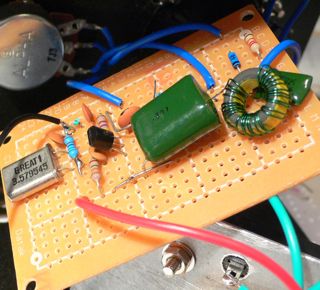 You might gather from this blog that I'm most comfortable with digital things - computers, software and even embedded microcontrollers seem very predictable to me. However, I'm very interested in learning the dark arts of radio frequency construction.
You might gather from this blog that I'm most comfortable with digital things - computers, software and even embedded microcontrollers seem very predictable to me. However, I'm very interested in learning the dark arts of radio frequency construction.There's a long term project on the bench here, a double sideband transmitter for 14Mhz. Everything was going quite well until I got to building a tuned circuit. Of all the components, small inductors are the most mysterious to me.
I mentioned my frustration to John Ha1e, VK2ASU, at a recent meeting of the NSW home brew group and he kindly offered to help me out.
John showed me how he measured small inductors, such as ones wound on drinking straws, using an inductance bridge. There are a number of circuits around the net, I built the excellent simple one by Drew Diamond, VK3XU from his first volume of "Radio projects for the amateur". A design based on his circuit is published here I just discovered.
Yes, it really dips on small inductors like the one shown above. In this picture it's not showing the dip as it would be boring to show a meter on zero! I have yet to calibrate this instrument but I think it can measure from about 1uH up.

As with all of my home brew, they look pretty messy when you open the case - but that's where the beauty is for me.
It's amazing how valuable it is to actually watch someone winding and measuring small tuned circuits, but after watching John at work I gained the confidence that these things do actually follow the laws of physics and now feel I'm on my way again.
Thankyou VK2ASU and VK3XU.
Update: It looks like I can measure from about 1uH to 10uH on this device. I went out this morning and purchased a collection of 10% inductors. There's something funny about the colour codes on inductors, the colour seems rather different to those on resistors for some reason.
4 comments:
Peter, if ever you need to measure a wider range, check out the one in March 2008 Lo-Key. Slightly different principle, similar components (especially the variable capacitor) but a wider measuring range (0.25 - 200 uH).
It's an adaption of another VK3XU circuit. Works well, though I can't claim to be impartial!
Thanks Peter, I've written off to the Lo-Key folks to subscribe and if possible get a copy of the March edition.
Digital is the make believe world- go cry ! :P
Analogue is the real world- it can never be escaped.
There are too many digital 'punks'
and not enough analogue warriors !:)
I like your website- more analogue !!!!
I can really relate to this blog since I'm in a ham club where we work with analog RF circuit design.
It's a lot of fun. Thanks for sharing.
Post a Comment